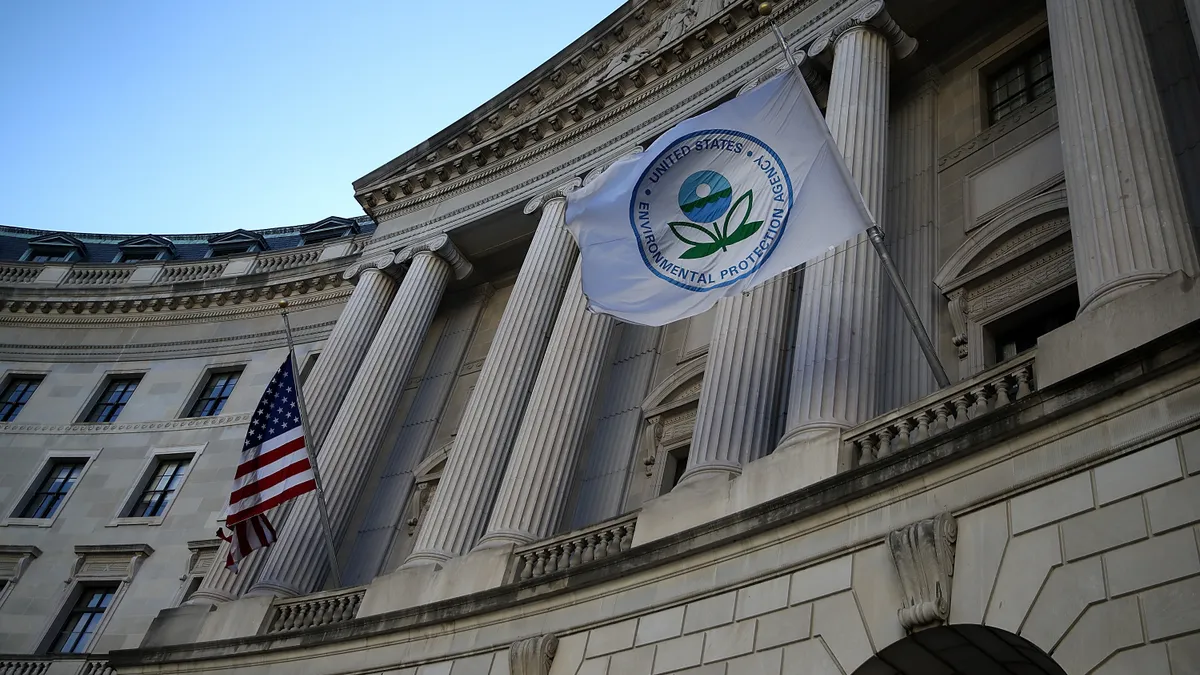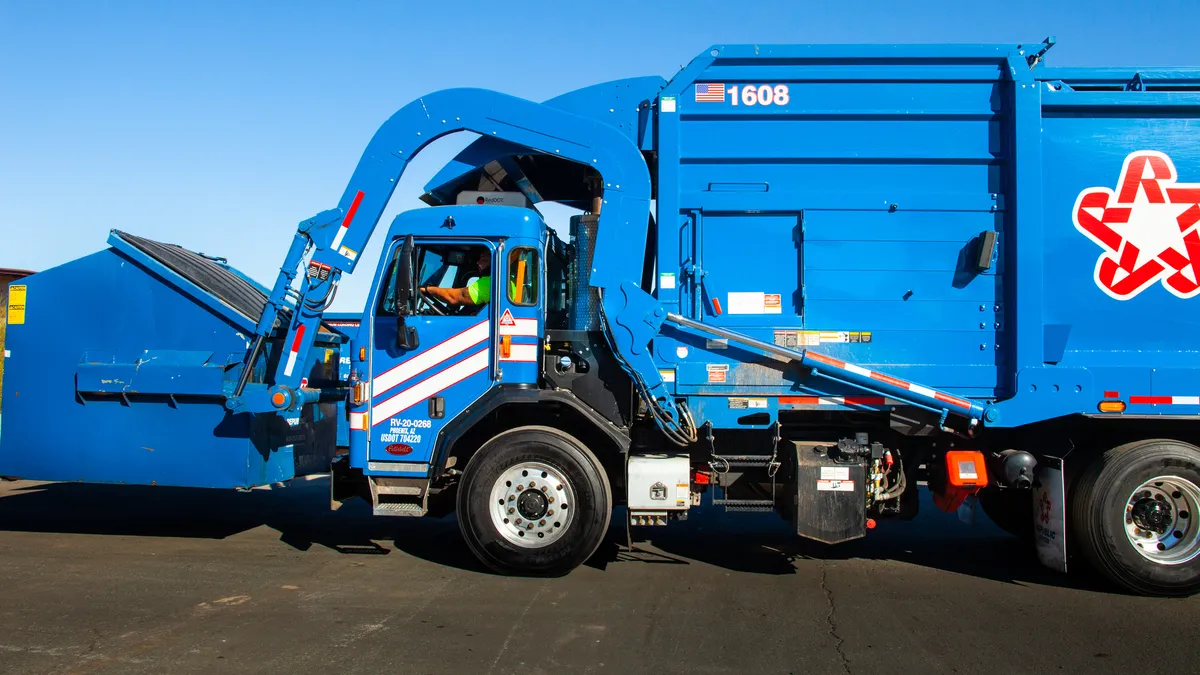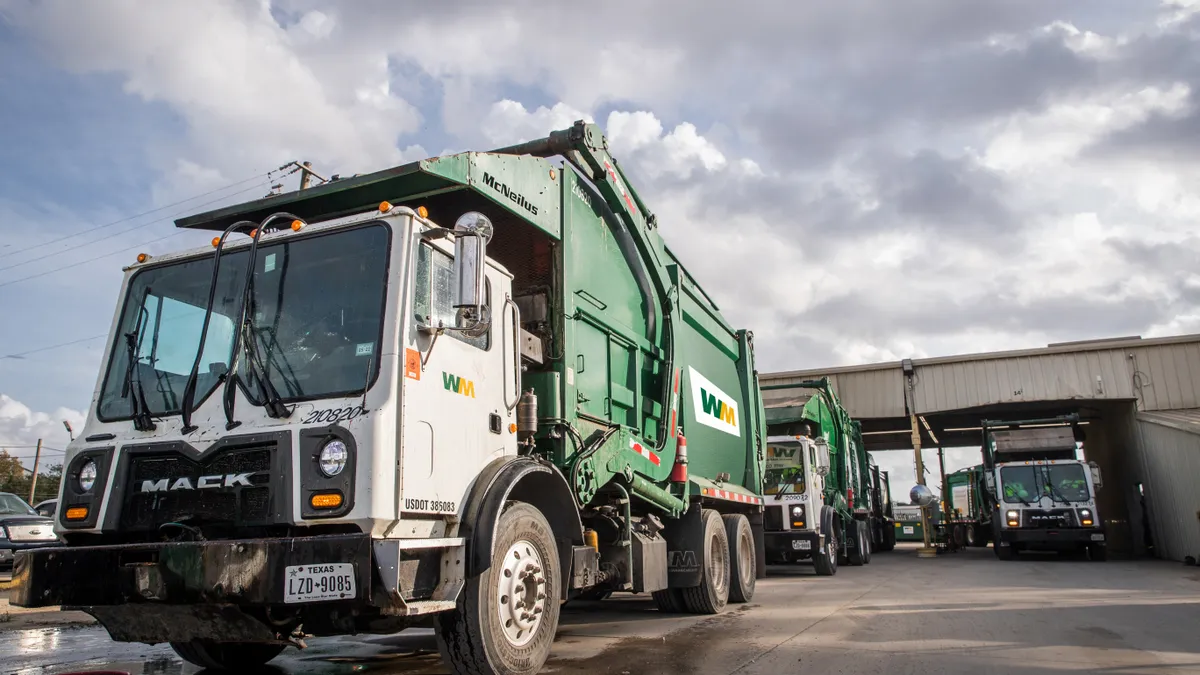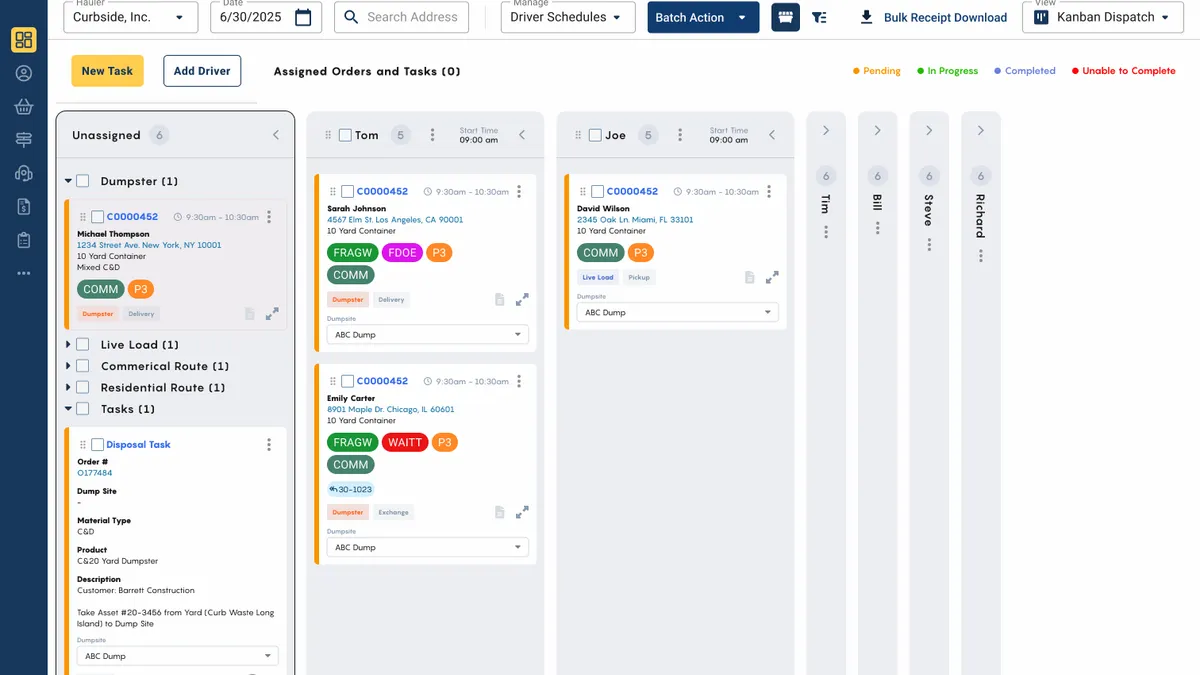In the new post-China recycling world, Waste Management has positioned itself as a leader moving toward whatever comes next. Brent Bell, president of the company's Recycle America division, has been a ubiquitous presence in the media as this plays out.
So far, comments from Bell and other executives have included plans to wage a "battle against contamination," drive more domestic demand for materials, increase the pace of greenhouse gas emissions reduction and test out a fully automated material recovery facility.
Amid this transition, Waste Management is projecting financial headwinds like everyone else and still adapting to the new realities of China curtailing its import appetite. During a SWANApalooza panel in Denver, Bell recognized that the country's new import policies had caught the industry by surprise, while also reaffirming a commitment to single-stream recycling.
Waste Dive sat down with Bell afterward to learn more about how the company's recycling business is faring, where it's finding new markets, when it believes a reliance on temporary labor presents safety challenges at MRFs, why recycling is seen as a better return on investment than disposal, and how it might adapt to a carbon tax — among other topics.
Excerpts from that interview have been edited for brevity and clarity. Parts of it, in italics, are described narratively from the author's reporting.
CHINA
WASTE DIVE: What's the current state of movement for material post-China? I know the import licenses are less than they were in the past. I've also heard of some material getting delayed at ports. Is that your experience?
BRENT BELL: I can tell you that the import licenses have been a lot less in some of our Chinese mills, customers that are over there. We actually have a presence in China as well, with essentially an agent that handles all of our materials. What they're saying, is there will be probably 30% less import licenses issued in 2018 as compared to 2017. So we will see a decline in that demand.
I think what we're seeing also, is with the 0.5% effective March 1, a lot of groups are very hesitant to move paper in.
With that March date in mind, have you been waiting to move anything?
BELL: We've always had the precedent to move material and worry about price second, just because moving it is our number one issue. It also becomes a safety issue when you have plants that have a lot of material stacked up.
And then, what are you storing it for? Are you speculating the market's going to go up or down? And every month you hold onto material longer for, it just decreases in value.
We've done a nice job with our team of actually moving material. I will say that it's been at much less than historically what we've seen in China. We've gotten other outlets in India and Southeast Asia, and then even domestically with Pratt being one of our largest partners for say mixed paper, which was included in the China ban.
NEW MARKETS
As you're finding these new markets, such as Southeast Asia now, at what point do you feel your company's responsibility ends for where the material is going? China moved away from importing due to environmental standards. Is it a concern that could come up with these other countries eventually?
BELL: I think absolutely. That's why I always try to focus on the 0.5% in saying, "Hey, take China's name out of it." That could be 0.5% to India next year, it could be 0.5% to South America, wherever we move materials to. That quality is something we need to make sure that we can make to all of our customers, because that's what they expect and that's what they're buying.
Bell goes on to say that because higher quality material moves first, Waste Management has prioritized investments to sustain that quality. The company also seeks to find markets that will be less volatile, even if they're less profitable, such as the move to India in recent years. The ongoing domestic partnership with Pratt Industries was also held up as a good example of long-term planning.
The point was, we knew we had to diversify, and so going into India and developing that market was a diversification play that really paid off in the fourth quarter, where essentially China said to us, 'Hey, the 100,000, 200,000 tons of mixed paper, we don't want it anymore, and by the way, your cardboard's being restricted, too.'
Say you're sending good quality though, does it matter where it's going? The reason I ask, is that the narrative on China from everyone in the industry seemed to be at first they were kind of mad. Then they said, 'We respect China's choices. We're glad China's cleaning up their environment. Good for China.' I haven't seen that logic shift to say Vietnam or India yet.
BELL: They're definitely committed to the environment, and now with the new president essentially becoming president for life, then it's not something that's going to go away in four or five years or whenever the next reelection would have been. So I think that the Chinese are committed to that platform. And that platform is an environmental one, but also an economic one for them, right? They said in their five-year plan that they would like to use more domestic material within China, and not import as much paper from other parts of the world.
When you look at the material that we're sending, like say mixed paper for example, there's a lot of people even domestically that can use that material for great products that they're making today... It's not that these other countries are necessarily a dumping ground by any means. They're just picking up on the markets where China has chosen not to participate in it.
Maybe in the future, China will just bring in more finished product for their box shops, and maybe there won't be any mills in China. I'm not sure what the outlook looks like for them, but I know that as a company, we need to always keep our handle on where those markets are going and where the best solution is. If we can support whoever is making those investments today, that's our goal.
But is there an assumption of good faith once brokers sell the material of, 'Hey, we're going to Vietnam, we hope it's not going to become marine debris' or 'It's going to India and we hope they have good labor conditions?'
BELL: The material that we export is traditionally the fiber-grade. So it's going to be cardboard, newspaper, and mixed paper, which is sorted mixed paper, even though I know the ban said unsorted mixed paper.
We don't move any of our plastics outside of the U.S. We've actually been fortunate to find domestic markets years ago, and we've really tried to encourage those markets to grow and support those markets.
That's one thing I would say the southeast part of the United States has really done a nice job at, on the plastics side, is they have developed and cultivated a lot of demand for those products. So whether you're talking about PET, HD, or even some of the 3-7s, they're taking that material and they're using them to integrate products that are sold domestically that create domestic jobs for the U.S.
When asked about Waste Management's plans to boost domestic demand, Bell said the key is to establish long-term value and be cautious. For example, business models that work on current low prices for mixed paper may not last and could lead to future disruptions. Part of this is also working to produce cleaner material from MRFs, which means revisiting contract terms with customers and reinforcing existing language around contamination.
We talk a lot about the economic side of contamination. I think the side that we miss a lot is the safety side. So if you look at our facilities, whether it's the tanglers, like the garden hoses, or the Christmas lights that wrap around the equipment, the propane tanks that come in, all of these create hazards for our employees.
Our plants still produce 70-80% fiber. And so if you have any type of explosion with these propane tanks, it creates a significant safety issue for our employees that work at these plants.
Bell said this has made MRFs "more and more of a dangerous place" that are increasingly prone to fires over the past year. He estimated almost 90% of those fires are tied to contamination from hot loads, propane tanks, batteries or many other items "that shouldn't have been there in the first place." While Operation Green Fence prompted some action, Bell said the company will be doing more now.
I think now is the time that we absolutely have to take a hard stance and it has to be a wake-up call for the industry to say, 'We've got to do something today about contamination, because this industry is suffering because of it.'
When asked what role public education will play in this, Bell mentioned the company's "Recycle Often, Recycle Right" program and said the goal is to simplify messaging to universally accepted items regardless of local rules. He said the public needs a "mass education program" and that if people saw how the system worked, they might understand.
MRF LABOR
Part of dealing with this contamination has been a concerted effort to slow down processing speeds, and in some cases, add labor for quality control. Those workers are often temporary employees, which CEO Jim Fish has previously recognized presents a safety challenge. The Bureau of Labor Statistics recorded an increased injury rate for MRF workers nationwide in 2016, which wouldn't have reflected any potential safety benefits from slowing down speeds yet, and likely doesn't include temporary workers due to reporting guidelines.
Since slowing down the lines have you seen a decrease in injury rates?
BELL: Our actual [total recordable injury rate], the last two years has been the lowest level we've had, but we've also had more fires than we've ever had before. So what I would say is our safety team's done a nice job on controlling the injuries and making sure that our folks are aware of what's coming on. With the fires and some of the other stuff you see in the stream today, it does make you think that that's getting above and beyond what we can manage.
Does that include temporary workers?
BELL: Yeah, that's counted in there.
One of the things we've done the last two years is really just say, 'Hey, if we want to build a safety culture, the safety cultures don't really get built with a temporary workforce.' And so we've really made a big push to convert the good employees from temporary to permanent workforce status.
I think we'll always have a certain percentage of temp employees because a lot of times, honestly ... people show up and then two hours later they say, 'This isn't for me.' So it wouldn't necessarily make sense for us to hire them full-time without getting some experience in there. So usually we have a 60- or 90-day window where they come, they get a feel for, this is the type of environment I can work in, I'm comfortable with it, I'll take a full-time job if that's available. So that's the reason why we have that transition phase there, just because it's not a job meant for everybody.
No, it's not. With that in mind, we hear a lot of talk about driver shortage, mechanic shortage. We don't hear as much about MRF sorter shortage. Is it just because it's easy to turn people over?
BELL: I'd say we still have that problem. The folks that we can get to show up to work on the line, they're some of the hardest-working folks, I believe, in the waste industry, for sure. But we've also found that there's kind of a family culture, if you will, that you walk into some plants and there's a lot of people there, relatives and friends with each other.
So when you build that network, it really is successful because they're carpooling to work together, they're showing up to work together. They're all friends and they've got that connection.
But I would say it's definitely still an issue for us, just because we're competing with a lot of other industries at a fairly, just slightly above minimum wage for the most part. There's probably a lot cleaner places to work for some people, and so it's a tough, tough role to fill.
It seems to be one of the lowest paid jobs in the industry. Is there any thought to raising the wages to incentivize people? Why would someone want that job?
BELL: Yeah, you're right. In certain parts, we do have to raise the wages to incentivize. What we try to do is come up with almost like career planning.
Let's just say your job is to do quality control on a plastic line. You can move up to be the line lead, we could give you some training classes on how to actually operate a piece of equipment, and once you're a permanent employee you can operate a baler, you can operate a forklift, you can operate a loader.
Bell describes the company's annual "Circle of Excellence" event recognizing top employees from around the country, which recently featured a plant manager from their Davis Street recycling facility in California. He started as a sorter and now runs one of the company's largest MRFs.
We really try to promote that these folks know that there's a path to doing something else ... If you're a temp worker, then you could come in tomorrow, and they could say, 'Oh, we lost the contract, go home.' You didn't see any vision for what your career could span. So really trying to give them that I think has helped out with some of the retention efforts.
Where does automation fit into that labor piece? Is that the ideal or is there always a place for human labor?
BELL: So we had this robot unit installed in the fourth quarter of 2017 at one of our facilities. We kind of did it as a test.
What we're finding with that unit is some success. It does about as good as one and a half, two sorters would do in a normal environment. There's a little bit more maintenance.
I think as you move to evolve in say systems that require less labor, I think you're going to see more investments in technicians that can actually handle that. These technicians are not the typical type, I would say, that have their wrenches in their toolbox. These are ones that are going to have to understand how computers work with wrenches, right? So it's part computer programmer, part technician.
So there will still be people in the plant, but maybe not sorters, or not as many?
BELL: Yeah, probably not as many. I think that when you look at that with labor being a big part of our program, I think that a lot of people would say that the jobs we're creating are a little bit more advanced-level jobs with the computer training. The lower-level jobs, honestly, those are ones that... they were hard positions to fill to begin with, and so they're kind of less desirable occupations that are out there, anyway.
Essentially what we're trying to do is just replace the jobs that a lot of people didn't want to begin with.
PRICING AND DISPOSAL COMPETITION
Waste Management prides itself on pricing discipline, which has come in handy at a time when commodity volatility makes it hard to sustain long-term municipal recycling contracts. Many municipalities have adapted to these terms, including a policy of no floor prices. Others, such as the company's headquarter city Houston, have not. While the city worked with Waste Management to drop glass in 2016, they recently chose FCC Environmental for a new long-term deal based in part on the floor price stipulation.
BELL: We'll still be processing their material until the other facility gets built up, and yeah, that's unfortunate that they made that decision. One of the big pieces that we absolutely couldn't do with our shareholders or our investments, is we absolutely can't guarantee a floor price for material anymore. We don't know where it's going to end up, and our shareholders have appreciated the fact that we made that stance on there, saying we can't hold the commodity volatility on our books anymore.
With some customers that have left us, that's probably one of their biggest sticking points is we can't commit to them a zero price for their materials, or a $20 rebate every year for materials. We're just not in the position to do that.
For the most part, they've understood, they've followed along. Because I'd say any competitor or anybody else that offers some guarantee out there, you've just got to make sure that are they going to be a sustainable partner for the life of that contract? How can they offer something like that and take a risk on that?
With pricing in mind, Waste Dive made the comparison between this model and the nonprofit or mission-driven models of some smaller recyclers. Those operations have said they find it hard to boost diversion in areas such as Colorado where landfill tip fees are low.
[They] would say it's hard to compete when tip fees are under $30. Theoretically, the company has control over the whole picture. Does that ever make your job harder?
BELL: One of the big core competencies that we have is pricing, right, and so we've done a nice job on that and a lot of our senior leadership team has said, "Hey, we've got to make sure we're pricing our materials right."
Bell goes on to mention a panel he spoke at during the Southeast Recycling Conference earlier that week, where financial analyst Michael E. Hoffman mentioned the need to raise pricing for curbside collection. Hoffman made similar comments during a subsequent panel in Denver.
You may bake in some volatility with recycling prices, but I would say that a lot of those contracts, they were based on a fixed-price per house, probably didn't anticipate the world we're seeing today. So that's where I'd say that on the pricing mechanism, we need to make sure that we price all the materials properly, and that if it's got to be on the collection side, we've got to make sure that there's some transparency that we can have when prices go up or down, we can actually share in that difference between what that initial contract stated.
Going back to the initial landfill rates ... I think obviously if those rates were higher, recycling programs, we'd get more diversion and more impact from that. As much as we do have a lot of landfills, there's also a lot of competition in the landfill business, as well. And so we've got to keep that in mind when they make those pricing decisions.
It seems there's different messages sometimes. There's the sustainability forum and the greenhouse gas reductions, and all those services that are offered. Then you look at the 10-K and it says reduction in landfill volume would hurt business.
BELL: Yeah.
Is that hard to square, or am I just missing something?
BELL: I think the one stat that we probably don't talk about enough is that the return on invested capital. So in terms of when the company decides, 'where am I going to spend my capital dollars,' recycling has historically, and I can guarantee you for 2017 was almost number one, number two, in terms of line of business for the best return on our capital.
So when the shareholders give us money and then we say, 'Where are we going to allocate that capital?' recycling has been the second best investment for that capital. Number one isn't landfills. Number one is actually collection of commercial containers.
When you look at gross cashflow the landfills generate, I guess you can look at a tonnage. We process 10 million tons of recycled material. Our landfills do nearly 100 million tons. It's a different spectrum that absolutely, there's a lot of cash just in magnitude. They do a lot more tons than we do.
What about the concept of a carbon tax, or something like it? Is Waste Management adaptable to that if say market realities change and landfills get more expensive, recycling gets more attractive? Are you ready to shift in that direction?
At this point, Bell defers to Susan Robinson — federal public affairs director — who has been observing the interview.
ROBINSON: I think my answer would be in California with the low-carbon fuel standard, we've adapted really well to that, and we've made investments in that. It's actually, between that and the RFS2 for the removal of gas that we're using in our trucks, we've actually learned how to work within that system.
So I think that is certainly something, if we were to see a carbon tax, we'd have a lot of opportunity in our business to be able to make that work.
Before wrapping up, the question is raised about Bell's projections for glass recycling in Massachusetts — home to Waste Dive's remote office. Following the closure of an Ardagh bottling plant markets have dried up and state disposal waivers are now being issued for multiple companies, including Waste Management.
What does that look like for glass in Massachusetts?
BELL: It doesn't look good, I can tell you that. That's one of the reasons why we've really focused on trying to work with the Glass Packaging Institute. It's so important for these products to make sure we have a demand ... The beer and the wine industry really need to understand that consumers want you guys to use recycled content, recycled glass in those materials. When that doesn't happen, then you see plants like this close down and it creates a problem for the public.
I think that glass recycling, if we can't get more demand out there, and Massachusetts may be just the first state that falls, if we can't get more demand for that product, then it's going to really suffer in the future. It's just so important to make that statement on the demand side of things.
For the latest on this situation, and additional comments from Bell, check out our piece here. In summation, Bell tied the demand pull argument back to broader contamination challenges and the future of recycling moving forward.
BELL: If we don't have a demand for these products, we're really going to suffer.
I think the industry's done a great job on diversion and going to zero waste and doing all this stuff. I think now it's time for the industry to wake up and say, 'Hey, we need to worry about the demand side just as much as we worry about how much we divert away from the landfills at this time.'
Because if the demand is not there for these materials, we're going to end up where we are today, where it just gets stockpiled up and we don't have a home for it.

















